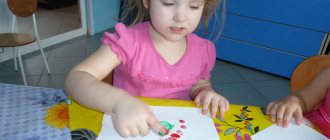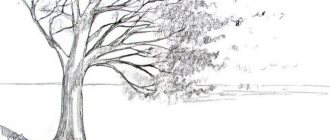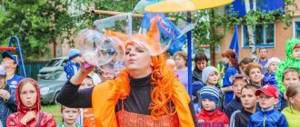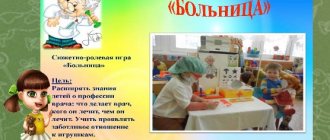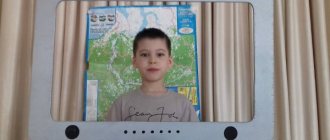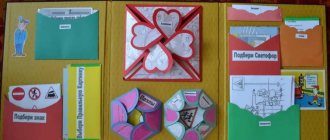Introducing preschool children to the origins of Russian folk culture
Fomina E.I. Introducing preschool children to the origins of Russian folk culture // Sovushka. 2020. No. 3(5). URL: https://kssovushka.ru/zhurnal/5/priobshchenie-detei-k-istokam-russkoi-narodnoi-kultury (access date: 10.10.2020).
The present time is characterized by the formation of a new education system: the teacher standard has been determined, framework documents have been developed that determine what the educational process should be (Law on Education in the Russian Federation, Federal State Educational Standard for Education). However, the determination of the content of training, the choice of methods and techniques are left to the teachers.
Speaking about the education of moral and ethical qualities, we think that there is a need to return to the best traditions of our people, its age-old roots.
We can conclude that the introduction of new technologies based on established traditions is the surest way to get a good result in the form of meeting target targets.
One of the principles of the Federal State Educational Standard for Educational Education is the introduction of children to sociocultural norms, traditions of the family, society and state. Cognitive development involves the development of primary ideas about the small homeland and Fatherland, about the sociocultural values of our people, about domestic traditions and holidays.
The main aspects of the sociocultural development of a preschooler are:
- Optimization of the sociocultural educational potential of the basic general education program.
- Value-semantic and sociocultural enrichment of the space of preschool education in preschool educational institutions based on the domestic sociocultural tradition.
In our opinion, the conscious formation of moral and ethical feelings, the cultivation of love for the Motherland, for the traditions of Russian folk culture should begin with the middle group. The preparatory stage can be considered the work carried out in the 2nd junior group.
Observations of the children in the group helped me determine a system of work based on introducing children to the national culture in accordance with the best traditions of pedagogy.
The introduction of children to Russian folk culture in our preschool institution is carried out through the relationship of the preschool institution with social institutions and the families of our students.
The purpose of this work is to educate preschoolers with patriotic feelings through introducing children to the origins of Russian folk culture.
To achieve this goal, the following tasks are envisaged:
- To instill in children a sense of love, duty, responsibility, respect for beauty, kindness, affection for their homeland, native places, and the Russian people.
- Develop the ability to restore connections between the past, present and future.
- To develop in the child the ability to understand the culture of his people and a positive attitude towards the culture of other peoples.
The developed long-term plan covers 4 years of activity in the following areas:
- Acquaintance with national life;
- Introduction to Russian folk art;
- Introduction to Russian folk games;
- Getting to know traditions;
- Holidays.
Problems in each area are solved in all age groups. The complexity of tasks can be traced from age to age.
Solving the assigned tasks involves the use of the following forms: GCD, game activities, circle work, excursions, holidays, theatrical and independent activities.
The formation of moral and ethical feelings, nurturing love for the Motherland, for the traditions of Russian folk culture is based on well-known principles: • the principle of intimacy, objectivity, emotional richness - the proposed material should be gradually more complex; • principle of accessibility – the information offered is adapted to the perception of preschool children; • the principle of scientificity and reliability - the content of information offered to preschoolers should be based on scientific facts, personal experience and sensory sensations of children • the principle of clarity and entertainment - educational material should arouse interest and emotional response in children; • the principle of historical sequence of generalizing factors; • the principle of a comprehensive and integrative approach - introducing preschool children to the origins of Russian folk culture is carried out through various types of activities in the educational process system, the use of various types and forms of interaction with children is proposed; • the principle of close cooperation between teachers and parents.
The expected result based on the results of mastering all areas for the preparatory group:
Knows the basic literary concepts of folklore; a summary of the literary works read; life and traditions of the Russian people; songs, ditties, nursery rhymes, riddles, proverbs, sayings, chants.
Knows how to tell Russian folk tales, nursery rhymes and act them out;
Uses household items of the Russian people in the game;
Creates creative works based on folklore works.
The presentation of the material occurs cyclically, through various types of activities (in a spiral, which allows you to replenish and improve previously acquired knowledge).
Methods and techniques remain priority :
- Problematic - search questions;
- Introduction of a new character;
- Analysis of proverbs and sayings;
- Creative tasks;
- Explanation of the origin of words;
- Analogy method;
- Working with models and diagrams.
The first direction involves getting to know the national way of life . As a result, children begin to understand the essence of Russian folk culture, its peculiarity, originality, and flavor. Work continues to create an atmosphere of national life; together with the children, the mini-museum organized in the group is replenished with objects of Russian life. It is known that surrounding objects have a great influence on the formation of a child’s mental qualities - they develop curiosity, cultivate a sense of beauty. Surrounding objects that awaken a child’s soul for the first time and instill in him a sense of beauty must be national. This allows children from a very early age to understand that they are part of the great Russian people. The second direction is that preschoolers continue to get acquainted with Russian folk art, complementing and deepening their knowledge. New sections “Getting to know Russian folk costume” and “Getting to know Russian folk cuisine” are being introduced, expanding children’s understanding of Russian folk culture.
The third direction is for children to get acquainted with the features of Russian folk games. I would like to note that these games do not have a competitive element, but, on the contrary, promote unity and the ability to perform joint movements. In Russian folk games we use chants, counting rhymes, and sentences.
The fourth direction is getting to know traditions. Unobtrusively, in a form that is easy to understand this material, something educationally new is presented. Acquaintance with Russian folk holidays takes place through the following events: quizzes, entertainment, holidays such as “Visiting Grandma Riddles”, “Open your heart - say a word”, “ Invocation of Spring”, etc.
Throughout the year, children in a playful, entertaining way clarify and consolidate their acquired knowledge about various areas of Russian folk culture. A special place during this period is occupied by the practical activities of children. An important role is played by the creation of a subject-development environment . The group should create a mini museum “Russian Folk Corner”, “Our Dear Rus'” where children receive and expand knowledge about the identity, color of the Russian people, Russian soul, Russian character. Where a wealth of material has been accumulated: didactic games and manuals for introducing children to Russian folk costume, Russian folk cuisine, folk games, crafts, and everyday life. The group has a lot of children's books, coloring books, didactic games, folders - progress on the topic.
When working to familiarize children with Russian folk art, we recommend using the following teaching aids: “Where there is a riddle, there is an answer”, “A clever proverb is said for a reason”, “What comes first, what comes next”, “Tell a fairy tale”, etc.
Children love to listen to fairy tales, jokes, nursery rhymes, songs, counting rhymes, and chants. They emanate goodness, warmth, and affection. You can use this in routine moments (washing hands, going to bed, when dressing and undressing).
Of course, this work requires enormous support from parents.
For them we propose to carry out:
— survey “What do you know?”
— consultations “My Russia”. "The Story of One Thing"
— Master class “How to make a baby book”
— design various exhibitions: “Objects of Distant Antiquities”, “My Mother Has Golden Hands”, etc.
There are many goals ahead and something to work on. But the main thing that we have achieved is a spark of interest in the eyes of children and parents, a desire to learn something new, collaborate, educate and develop all this further!
BIBLIOGRAPHY:
- Alexandrova E.Yu., Gordeeva E.P. System of patriotic education in preschool educational institutions. Volgograd: Teacher, 2007.
- Alyabyeva E.A. Moral and ethical conversations and games with preschoolers. The relationship between public and family education of preschool children. N. Novgorod, 2005;
- Education of moral feelings in older preschoolers. Ed. Vinogradova A.M. M.: Education, 1989.
- Educational system “Little Russians” Arapova-Piskareva N.A. M.: Mosaika-synthesis, 2004.
- Danilina G.N. For preschoolers about the history and culture of Russia. M.: ARKTI, 2005.
- Dyaunenova I.A. Patriotic education of preschool children through local history and tourism activities. M.: ARKTI, 2004.
- Zelenova N.G. We live in Russia. Preparatory group. N. Novgorod, 2007.
- We introduce preschoolers to family and ancestry. E.K. Revina M.: Mosaika-Sintez, 2008.
- Komratova N.G., Gribova L.F. Social and moral education of children 3-4 years old. M.: Sfera, 2005.
- Labunskaya G.V. Artistic education of children in the family. M.: Pedagogy, 1970.
- Lopatina A.A. Education of moral qualities in children. M.: Knigolyub, 2007.
- Makhaneva M.D. Moral and patriotic education of preschool children. M.: Sfera, 2009.
- Mulko I.F. Social and moral education of children 5-7 years old: a methodological manual. M.: Sfera, 2006.
- Mulko I.F. Development of ideas about man in history and culture. M.: Sfera, 2007.
- Moral and aesthetic education of a child in kindergarten. Ed. Vetlugina N.A. M.: Education, 1989.
- The unknown is nearby / O.V. Dybina et al. M.: Sfera, 2010.
- Introducing preschoolers to the origins of Russian folk culture in a compensatory kindergarten. Sarov, 2001.
- Sertakova N.M., Kuldashova N.V. Patriotic education of children 4-7 years old based on design and research activities. In: Teacher, 2020.
Introducing older preschoolers to folk culture in the context of the Federal State Educational Standard for preschool education
Gulyaeva Tatyana Anatolyevna, music director of State Budgetary Educational Institution Secondary School No. 19 of the joint venture "Kindergarten "Korablik" Novokuybyshevsk, Samara Region Introducing older preschool children to the origins of folk culture in the conditions of the Federal State Educational Standard of preschool education
The article presents the experience of the music director of a kindergarten in introducing older preschoolers to the origins of folk culture culture by means of specially organized activities and subject-developing environment. The material may be useful to preschool and school teachers. Currently, our country is going through a difficult period, where ideas about kindness, mercy, citizenship and patriotism are being lost. There is an urgent need for qualitative changes in the activities of a preschool educational organization as the first stage of the system of continuous education of the younger generation, because the formation of his consciousness and attitude towards the environment depends on what a child sees and hears from childhood. One of the tasks of the Federal State Standard of Preschool Education, approved by order of the Ministry of Education and Science of the Russian Federation dated October 17, 2013 N 1155, is to combine training and education into a holistic educational process based on spiritual, moral and sociocultural values and rules accepted in society and norms of behavior in the interests of the individual, family, society; the formation of a general culture of children’s personality, the development of their social, moral, aesthetic, and intellectual qualities. In this regard, mastering the folk heritage, which naturally introduces the child to the foundations of national culture, becomes especially important. Through the perception of folklore, the foundations of moral consciousness are laid, national self-awareness is fostered, and folk traditions are preserved. Folklore is not so much an art as a part of the very life of the people, because folk music was not created for listening, it lived in action: play, ritual, procession, work. That is why the musical principle in folklore is inseparable from dance, movement, gestures, exclamations, and facial expressions. Thus, introducing a child to musical folklore corresponds to new standards of education, as it occurs through his activities. Despite the fact that in kindergarten, much attention has always been paid to the perception of folklore by preschoolers, contradictions have arisen between the desired results of the educational process and the real situation. According to the Federal State Educational Standard for preschool education, the development of a child should be carried out in communication, play, cognitive-research, and not in educational activities. The achievements of preschool children should be determined not by specific knowledge, skills and abilities, but by a set of personal qualities that ensure successful socialization during the transition to a new level of education. However, at present, the repertoire for the holidays is being memorized, there is a fascination with stage-effective material, folk music is offered in modern adaptation, and children have not formed ideas about the cultural and historical past of the Russian people. In kindergarten, there is no system for conducting specially organized classes, the subject-development environment is not equipped, there is insufficient methodological support, which ultimately does not contribute to a holistic perception of folklore, and therefore the spiritual and moral education of a preschooler. This was the problem in my professional activity. I set a goal for myself : to educate the spiritual and moral values of preschool children by introducing them to the origins of folk culture, to develop musical and creative abilities in the conditions of specially organized activities and a subject-development environment.
To achieve new educational results, it was necessary to create new conditions.
Scientific and methodological:
- creation of a library of sheet music and fiction, CD collections of the best examples of children's folk vocal and instrumental music and a video library with thematic selections;
-creation of a card index of musical folk games; -creation of electronic educational resources; - mastery of methods for the formation of folk musical culture and their application in practical activities; -development of notes on additional educational activities within the framework of comprehensive thematic planning; — development of holiday and entertainment scenarios; — preparation of consultations for parents. Logistical: -availability of special premises; - presence of a basic musical instrument; — creation of a subject-developing environment; -availability of multimedia equipment. Informational: - survey of parents; — holding open classes for parents; — organizing group classes with parents; — preparation of photo reports; — posting consultations, recommendations, photo and video reports on the preschool website. Organizational: -involving parents in participating in national holidays, replenishing exhibits in the museum of folk life, producing manuals, attributes, and costumes. — organizing interaction between kindergarten teachers; — organizing creative meetings with folklore groups of the city. With the aim of an integrated approach, I developed a calendar-thematic plan
for additional education of children of senior preschool age to familiarize them with folk culture, approved by the pedagogical council of the preschool educational institution.
The content of the classes includes all types of musical activities (perception, performance, song and dance creativity), as well as acquaintance with folk life, poetic and artistic creativity. The planning is made for children of the senior and preparatory groups. The activity is carried out 4 times a month on a certain day of the week in the afternoon for 30 minutes in the mini-museum “Russian Izba”. The museum was created by teachers and parents. It contains both authentic exhibits of ancient Russian life and their toy analogues, which a child can approach, examine and understand how they work. Authentic museum exhibits are of particular value, because touching an old real thing touches the strings of the soul that are silent when looking at illustrations, which is important for the impressionable child’s soul, for which “knowledge” about historical objects turns into “personal involvement in the history of the people.” We made costumes and attributes for staging folk songs, masks-caps for musical and outdoor games, folk musical instruments, and dolls for folk theater. In the mini-museum, children are involved in activities and communication, influence on their emotional sphere, development not through passive “seeing”, but through active “doing”, the formation of the child’s moral personality. To monitor the effectiveness of work, I developed criteria for determining performance based on the approximate Basic General Developmental Program of Preschool Education “From Birth to School” edited by N.E. Veraksa, T.S. Komarova, M.A. Vasilyeva: - Pupils know the traditions and customs of Russian people, are oriented in folk holidays, crafts, objects of folk life, can tell about them; -Use small forms of oral and musical folk art in everyday life; -Know and perform Russian folk songs, organize folk games; -Singers intone clearly and reproduce them on musical instruments; -Compose dances from familiar dance elements, perform formations in round dances; - Possess the skills of conveying the emotional and figurative content of works in musical and theatrical activities; -Distinguish the sound of folk instruments in an orchestra and name them. -Know the techniques of playing two and three spoons, play in an ensemble. I conduct control tests at the beginning and end of the school year. Forms of control - conversations, observations, theatrical performances and concerts, folklore festivals. Thus, only a specially developed system for organizing the educational process and an effective subject-development environment actively introduces preschoolers to the origins of folk culture, which contributes to their spiritual and moral education.
We recommend watching:
Has the Federal State Educational Standard come into force? Scenario of winter entertainment for older preschoolers Author's folk song for preschoolers “Russian Dance” Musical pedagogical project in kindergarten. Senior group
Similar articles:
Scenario of a folklore holiday for older preschoolers
Thematic lesson in the senior group. Slavic mythology
Methods of conducting physical education classes in kindergarten
Folklore for children 2-4 years old in kindergarten
Lullabies in child development
